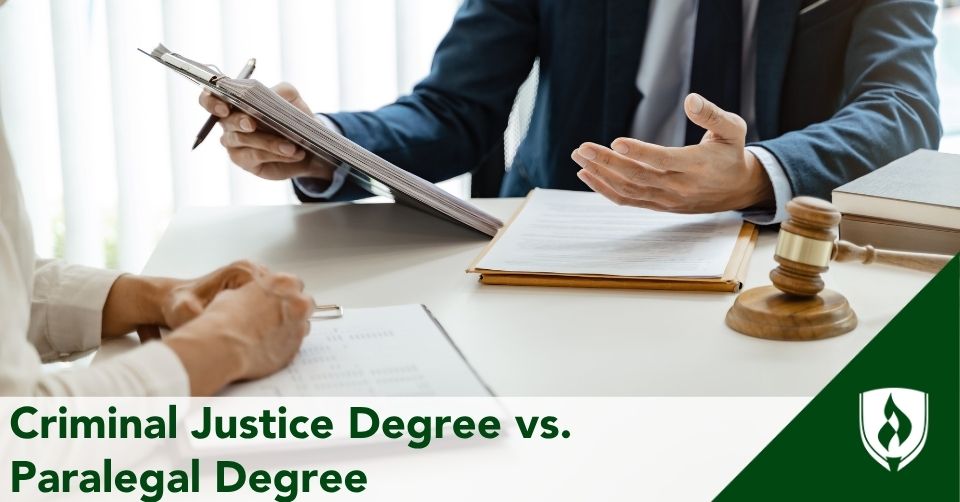Criminal Justice Degree vs Paralegal Degree: Which Is Right for You?
08/12/2025

If you’re looking into educational options in the legal field, two distinct paths to consider are a criminal justice degree or a paralegal degree. Each program is focused on knowledge and skills related to various roles within the criminal justice system or legal profession. To decide which aligns more closely with your goals, explore their content, structure, and real-world applications.
Understanding Criminal Justice and Paralegal Degree Programs
Criminal Justice Degree
A criminal justice degree can offer a comprehensive understanding of how society responds to crime1 through law enforcement, courts, and correctional systems. At Rasmussen University, the criminal justice degree program2 is designed to help students make a tangible difference in their communities by focusing on criminology, practical psychology, juvenile justice and criminal law.
Offered at both the associate3 and bachelor’s4 levels, the curriculum includes scenario-based assessments and applied learning that are developed and validated by seasoned professionals with experience in agencies such as the FBI, DEA, United States Secret Service, Homeland Security, and more. Students can earn credit through Rasmussen’s Knowledge Credit® system,5 potentially completing up to 67% of their program based on prior learning or military experience.
Paralegal Degree
In contrast, a paralegal degree6 trains students to become indispensable members of legal teams by supporting attorneys in legal research, writing, document preparation, and family law. Rasmussen University offers both an associate degree7 in paralegal studies and an accelerated paralegal certificate8 for those who already hold a degree.
Students explore civil litigation, criminal law, legal ethics, and property and estate planning. Instruction emphasizes using industry tools like Lexis+®, Clio, and vLex. The program culminates6 in a capstone project that simulates daily work in a law firm, preparing graduates to contribute meaningfully in legal environments.
How Criminal Justice and Paralegal Programs Are Structured
Criminal Justice Program
Criminal justice students at Rasmussen participate in coursework that blends theoretical knowledge with real-world application.
For the Associate Degree in Criminal Justice,3 the curriculum's core courses provide a foundational understanding of the criminal justice system. These include introductory courses like "Introduction to Criminal Justice," "Criminology," and "Criminal Procedure." The emphasis is on providing students with a broad overview of the field's key components and legal frameworks.
In contrast, the Bachelor's Degree in Criminal Justice Leadership and Management4 features a more advanced and specialized set of core courses, reflecting its focus on leadership, management, and research within the criminal justice sphere. Beyond foundational courses, students engage with subjects such as "Communication Strategies for Criminal Justice Professionals," "Research Methods in Criminal Justice," and "Criminal Justice Leadership and Management." This curriculum aims to prepare students for leadership roles by developing critical thinking, research, and managerial skills pertinent to the complexities of the criminal justice system.
Paralegal Program
Paralegal students also benefit from a practice-focused structure. For the Paralegal Certificate,8 the core courses are designed to provide a focused and practical foundation for entry-level paralegal roles. Key courses include "Introduction to Law and the Legal System," "Introduction to Legal Research," and "Criminal Law and Procedure." Students also gain essential skills in "Legal Ethics," "Civil Litigation," and "Legal Writing." The curriculum is capped with "Paralegal Associate Capstone," indicating a comprehensive review of learned material, preparing students for immediate professional application.
The Paralegal Associate Degree,7 while sharing some foundational courses with the Certificate, expands upon the core curriculum to offer a broader and more in-depth legal education. In addition to courses like "Introduction to Law and the Legal System" and "Introduction to Legal Research," the degree includes subjects such as "Computer Applications and Business Systems Concepts," "Contracts," "Torts," and "Corporate Law." This program aims to provide a more comprehensive understanding of legal principles and business applications, equipping graduates with a wider range of skills applicable to diverse paralegal responsibilities.
What Can You Do With a Criminal Justice Degree?
Whether in community-based policing or data-driven roles within government agencies, criminal justice professionals aim to prevent crime and ensure community safety. Graduates of criminal justice programs2 often pursue careers that engage with the public, such as:
- Court clerk
- Security officer
- Crime victims advocate
- Security manager
- Corporate security supervisor
- Corrections or law enforcement officer
What Can You Do With a Paralegal Degree?
Paralegal program graduates,6 on the other hand, typically work behind the scenes in structured legal environments, in roles like:
- Paralegal
- Legal secretary
- Legal assistant
- Compliance specialist
- Court administrative assistant
- Court clerk
- File clerk or contract specialist
- Compliance officer
Law firms, corporate legal departments, nonprofit advocacy organizations, and government offices rely on paralegals to support litigation, manage legal documentation, and maintain organization in fast-paced settings.9
Technology, Ethics, and Transferable Skills
Both career paths require fluency with technology. In criminal justice, this might mean working with digital forensics tools, surveillance systems, or data analytics platforms to support investigative and public safety efforts10. In paralegal work, technology plays an equally important role. Students learn to use databases6 like Westlaw and Lexis+®, as well as case management systems and e-filing platforms. Rasmussen ensures students in both programs are proficient with these technologies to meet employer expectations.
Ethics is a cornerstone in both criminal justice11 and paralegal12 programs. If professionals are serving as a public servant or supporting legal teams in confidential matters, students are taught to navigate their responsibilities with integrity. Communication skills, attention to detail, and the ability to follow procedural law are emphasized throughout both degree paths, equipping graduates to work in high-stakes environments with professionalism.
Key skills developed in both programs include:
- Critical thinking and ethical reasoning
- Legal writing and documentation
- Technology fluency and case management
Decision-Making Guidance
If you're torn between the two programs, consider where your interests and strengths lie. Do you envision yourself helping to enforce laws, understand criminal patterns, and contribute to public safety? Or does supporting attorneys through legal research, documentation, and case preparation appeal more? A criminal justice degree2 might be ideal for those drawn to law enforcement, policy work, or corrections, while a paralegal degree6 is better suited for those who enjoy precision, research, and written communication within legal contexts.
Rasmussen University supports both paths with fully online programs, expert faculty, and career-focused learning. If your goal is to join the police force, contribute to the justice system from a policy angle, or work in a legal office drafting motions and organizing case files, the education you choose should reflect how you want to contribute to the broader field of law and justice.
Some questions to help you decide:
- Do you prefer working with people in public safety settings or supporting legal procedures behind the scenes?
- Are you more interested in preventing crime or in analyzing and applying the law?
- Would you rather investigate criminal behavior or prepare legal cases?
Choosing the Right Path for Your Career Goals
Deciding between a criminal justice degree vs paralegal degree isn’t just about choosing a major, it’s about identifying how you want to apply your skills within the legal system. Rasmussen’s criminal justice program offers a path into public service and law enforcement, while its paralegal studies program prepares students for collaborative legal support roles. Both degrees can serve as stepping stones toward a career, depending on your interests.
If you’re passionate about law, structure, and systems, and you want to support clients, lawyers, or public institutions, start by exploring the specifics of these programs. With practical training, experienced instructors, and flexible formats, Rasmussen University can help you move confidently toward your professional goals in the legal field.
Want to explore what you can do with a career in criminal justice? Learn how a degree in this field can open doors to diverse and meaningful career paths — and find out how to get a criminal justice degree to start your journey.
LexisNexis is a registered trademark of Reed Elsevier Inc.
1Office of Justice Programs, “Functions of the Criminal Justice System: Procedures, Tasks, and Personnel,” available at https://www.ojp.gov/ncjrs/virtual-library/abstracts/functions-criminal-justice-procedures-tasks-and-personnel (accessed July 2, 2025).
2Rasmussen University, “Criminal Justice Degree,” available at https://www.rasmussen.edu/degrees/justice-studies/criminal-justice/ (accessed July 2, 2025).
3Rasmussen University, “Associate’s Degree in Criminal Justice,” available at https://www.rasmussen.edu/degrees/justice-studies/criminal-justice/associates/ (accessed July 2, 2025).
4Rasmussen University, “Bachelor’s Degree in Criminal Justice,” available at https://www.rasmussen.edu/degrees/justice-studies/criminal-justice/bachelors/ (accessed July 2, 2025).
5Rasmussen University, “Transfer Policy,” available at https://www.rasmussen.edu/admissions/transfer-policy/ (accessed July 2, 2025).
6Rasmussen University, “Paralegal Degree,” available at https://www.rasmussen.edu/degrees/justice-studies/paralegal/ (accessed July 2, 2025).
7Rasmussen University, “Associate’s Degree in Paralegal Studies,” available at https://www.rasmussen.edu/degrees/justice-studies/paralegal/associates/ (accessed July 2, 2025).
8Rasmussen University, “Paralegal Certificate,” available at https://www.rasmussen.edu/degrees/justice-studies/paralegal/certificate/ (accessed July 2, 2025).
9Bureau of Labor Statistics, “Paralegals and Legal Assistants,” OOH tab 3: “Work Environment,” available at https://www.bls.gov/ooh/legal/paralegals-and-legal-assistants.htm#tab-3 (accessed July 2, 2025). Employment conditions in your area may vary.
10Federal Bureau of Investigation, “Science and Technology,” available at https://www.fbi.gov/how-we-investigate/science-and-technology (accessed July 2, 2025).
11Bureau of Labor Statistics, “Police and Detectives,” OOH tab 4: “Work Environment,” available at https://www.bls.gov/ooh/protective-service/police-and-detectives.htm#tab-4 (accessed July 2, 2025). Employment conditions in your area may vary.
12Bureau of Labor Statistics, “Paralegals and Legal Assistants,” OOH tab 4: “Work Schedules,” available at https://www.bls.gov/ooh/legal/paralegals-and-legal-assistants.htm#tab-4 (accessed July 2, 2025). Employment conditions in your area may vary.



